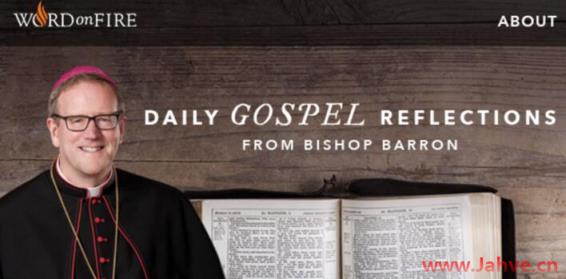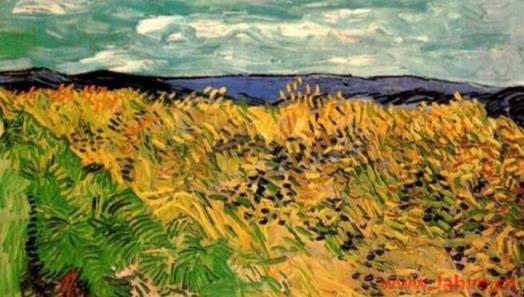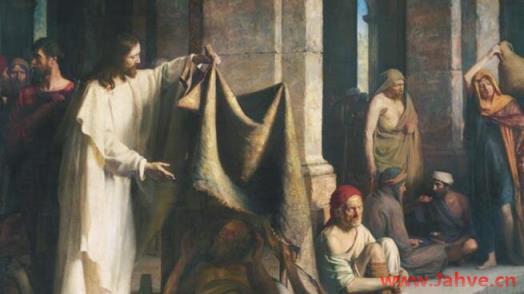
原文|Bishop Barron
翻译|Carrie2017-7-23 朋友们,今天的福音是关于良莠不齐的比喻。天主的圣言创建了教会,把那些努力建设天国的人们团结起来。但这个教会从来都不是一尘不染、无拘无束的,那是因为一种灵性力量,一个仇人在抵抗天主。这个仇人就是要偷偷摸摸地、悄无声息地、掩人耳目地在麦子中间撒上莠子。这种善恶共存的局面是意料之中的。教会将永远是圣人和罪人聚首之地,而罪人通常会貌似圣人。教会的仇人永不止息地确保这个阴谋得逞。当我们发现邪恶,都会磨拳擦掌,追而逐之、斩草除根的念头非常诱人。但福音中主人的警告是极其重要的。正因为善恶是相关联的,所以我们的热情冲劲有时会引起更为严重的问题。那么我们应该怎样做?暂时让麦子莠子一起生长吧。到最后收割时,主人将会把两者分开。Friends, our Gospel today is the parable of the weeds among the wheat. God's word creates the Church, the community of those who strive to build up the Kingdom. But this Church is never absolutely pure and untrammeled, for God's ways are opposed by a spiritual power, an enemy. His task is to sow weeds among the wheat—clandestinely, quietly, unobtrusively.This sort of coming-together of good and evil is to be expected. The Church will always be a place of saints and sinners, and the sinners will often look like saints. The enemy of the Church, who never rests, ensures it.When we discover evil, it is always very tempting to go after it with both fists, to take it out. But the warning of the Master here is extremely important. Sometimes, our zeal can lead to far greater problems, precisely because of the way evil is related to the good.So what should we do? Let them grow side-by-side for the time being. At the end, at harvest time, the Master will separate them out.2017-7-22
朋友们,今天的福音是关于良莠不齐的比喻。天主的圣言创建了教会,把那些努力建设天国的人们团结起来。但这个教会从来都不是一尘不染、无拘无束的,那是因为一种灵性力量,一个仇人在抵抗天主。这个仇人就是要偷偷摸摸地、悄无声息地、掩人耳目地在麦子中间撒上莠子。这种善恶共存的局面是意料之中的。教会将永远是圣人和罪人聚首之地,而罪人通常会貌似圣人。教会的仇人永不止息地确保这个阴谋得逞。当我们发现邪恶,都会磨拳擦掌,追而逐之、斩草除根的念头非常诱人。但福音中主人的警告是极其重要的。正因为善恶是相关联的,所以我们的热情冲劲有时会引起更为严重的问题。那么我们应该怎样做?暂时让麦子莠子一起生长吧。到最后收割时,主人将会把两者分开。Friends, our Gospel today is the parable of the weeds among the wheat. God's word creates the Church, the community of those who strive to build up the Kingdom. But this Church is never absolutely pure and untrammeled, for God's ways are opposed by a spiritual power, an enemy. His task is to sow weeds among the wheat—clandestinely, quietly, unobtrusively.This sort of coming-together of good and evil is to be expected. The Church will always be a place of saints and sinners, and the sinners will often look like saints. The enemy of the Church, who never rests, ensures it.When we discover evil, it is always very tempting to go after it with both fists, to take it out. But the warning of the Master here is extremely important. Sometimes, our zeal can lead to far greater problems, precisely because of the way evil is related to the good.So what should we do? Let them grow side-by-side for the time being. At the end, at harvest time, the Master will separate them out.2017-7-22 朋友们,今天是玛利亚·玛达肋纳的庆辰。福音说到玛利亚在一周的第一天清晨,来到主的坟前。我们来设想一下当时的情景:天还黑——就像在起初天主说:“有光”之前那样。但光即将照耀,一个全新的天地即将呈现。石头已被移开。堵塞在耶稣之墓口的这块大石代表着死亡的定局。当亲人去世,他们似乎就被巨石阻挡着,永远和我们生死相隔。正因如此,我们为死亡而哭泣——不仅仅是因为悲伤,而且还因为一种来自生命存亡的挫败感。毫无疑问,玛利亚·玛达肋纳以为有人盗墓了。绝妙的《若望福音》式讽刺在于史上最了不起的盗墓者确实已经出动。在《厄则克耳》一书中,我们读到这句话,“我要亲自打开你们的坟墓;我要从你们的坟墓中把你们领出来”。这个梦寐以求的愿望、这个长久以来被认为无望的希望终于成为现实。天主已经打开了祂的亲子之墓。
朋友们,今天是玛利亚·玛达肋纳的庆辰。福音说到玛利亚在一周的第一天清晨,来到主的坟前。我们来设想一下当时的情景:天还黑——就像在起初天主说:“有光”之前那样。但光即将照耀,一个全新的天地即将呈现。石头已被移开。堵塞在耶稣之墓口的这块大石代表着死亡的定局。当亲人去世,他们似乎就被巨石阻挡着,永远和我们生死相隔。正因如此,我们为死亡而哭泣——不仅仅是因为悲伤,而且还因为一种来自生命存亡的挫败感。毫无疑问,玛利亚·玛达肋纳以为有人盗墓了。绝妙的《若望福音》式讽刺在于史上最了不起的盗墓者确实已经出动。在《厄则克耳》一书中,我们读到这句话,“我要亲自打开你们的坟墓;我要从你们的坟墓中把你们领出来”。这个梦寐以求的愿望、这个长久以来被认为无望的希望终于成为现实。天主已经打开了祂的亲子之墓。
Friends, today we celebrate the feast of St. Mary Magdalene. Our Gospel says Mary came to the Lord’s tomb early in the morning on the first day of the week.Let’s place ourselves there: it is still dark—just the way it was at the beginning of time before God said, “Let there be light.” But a light is about to shine, and a new creation is about to appear.The stone had been rolled away. The stone blocking entrance to the tomb of Jesus, stands for the finality of death. When someone that we love dies, it is as though a great stone is rolled across them, permanently blocking our access to them. And this is why we weep at death—not just in grief but in a kind of existential frustration.Undoubtedly, Mary Magdalene thought that a grave robber had been at work. The wonderful Johannine irony is that the greatest of grave robbers had indeed been at work.In the book of prophet Ezekiel, we hear this, “I will open your graves and have you rise from them.” What was dreamed about, what endured as a hope against hope, has become a reality. God has opened the grave of his Son.2017-7-21 四部福音书三番五次地描写了耶稣违反在第七日休息这个神圣诫命的行为。比如说,祂经常在安息日治愈病人,令护卫犹太律法的人们惊恐不安。今天的福音中,耶稣的门徒在安息日掐麦穗吃,然后祂宣布自己是“安息日的主”。在公元一世纪时,一个犹太人作出如此的声称,那种惊心动魄的程度是一言难尽的。只有雅威才能配得上“安息日的主”这个称号,那么耶稣在暗示什么呢?简而言之,耶稣宣称的是,因为祂是上主,所以祂凌驾于礼仪之上,甚至高于虔诚犹太人的定义性习俗。因此,规章惯例必须隶属于天国,而此时此刻这个天国正在主耶稣的引领下进入人间。
四部福音书三番五次地描写了耶稣违反在第七日休息这个神圣诫命的行为。比如说,祂经常在安息日治愈病人,令护卫犹太律法的人们惊恐不安。今天的福音中,耶稣的门徒在安息日掐麦穗吃,然后祂宣布自己是“安息日的主”。在公元一世纪时,一个犹太人作出如此的声称,那种惊心动魄的程度是一言难尽的。只有雅威才能配得上“安息日的主”这个称号,那么耶稣在暗示什么呢?简而言之,耶稣宣称的是,因为祂是上主,所以祂凌驾于礼仪之上,甚至高于虔诚犹太人的定义性习俗。因此,规章惯例必须隶属于天国,而此时此刻这个天国正在主耶稣的引领下进入人间。
Again and again in the Gospels, Jesus is portrayed as violating the sacred command to rest on the seventh day. For example, he often cures on the Sabbath, much to the dismay of the protectors of Jewish law.And then in today's Gospel, after his disciples pick grain on the Sabbath, Jesus declares himself "Lord of the Sabbath." It's hard to express how breathtaking this claim would be for a first-century Jew to make. Yahweh alone could be assigned the title, "Lord of the Sabbath," so what is Jesus implying?In short, he is claiming that he is above their rituals, even perhaps the defining practice of pious Jews, because he is the Lord. Thus the rules must be placed in subordination to the Kingdom of God, the Kingdom that the Lord Jesus is ushering in even here and now.

微信小程序
微信扫一扫体验

微信公众账号
微信扫一扫加关注
顶部
